Just a Shot Away
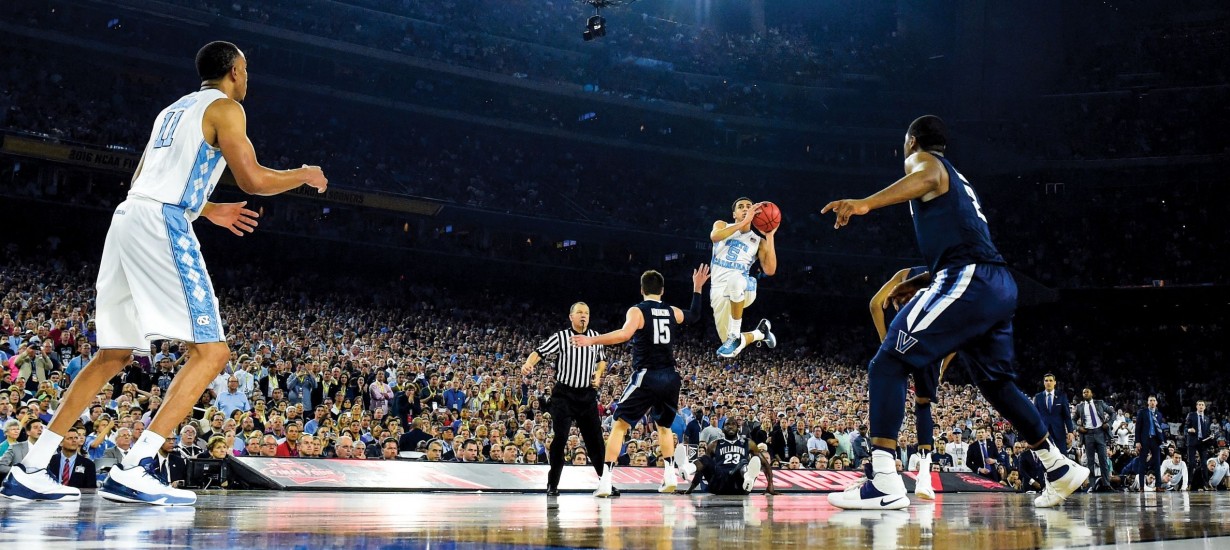
The two best teams in the tournament met in the final, and by any assessment it was a classic. Both can’t win, but this was about as close as you can get.
by Barry Jacobs
Americans love to celebrate winning and winners. Sportsmanship and integrity in pursuit of our goals are woven into the equation, but competition is treated as incomplete without victory. As the aphorism reminds us, “Close only counts in horseshoes and hand grenades.” Or, if you prefer, “To the victor go the spoils.”
Competitors are discouraged from entertaining even the thought of defeat as if it was a mental contagion, although in most endeavors, sports especially, half of the participants lose. Yet, as the Carolina men’s basketball team demonstrated in the national championship game on April 4 at Houston, winning is not the only thing. Transcendence can be achieved in fighting well to the last unrequited tick of the clock; honor can be found amid the sting of the most exquisite defeat.
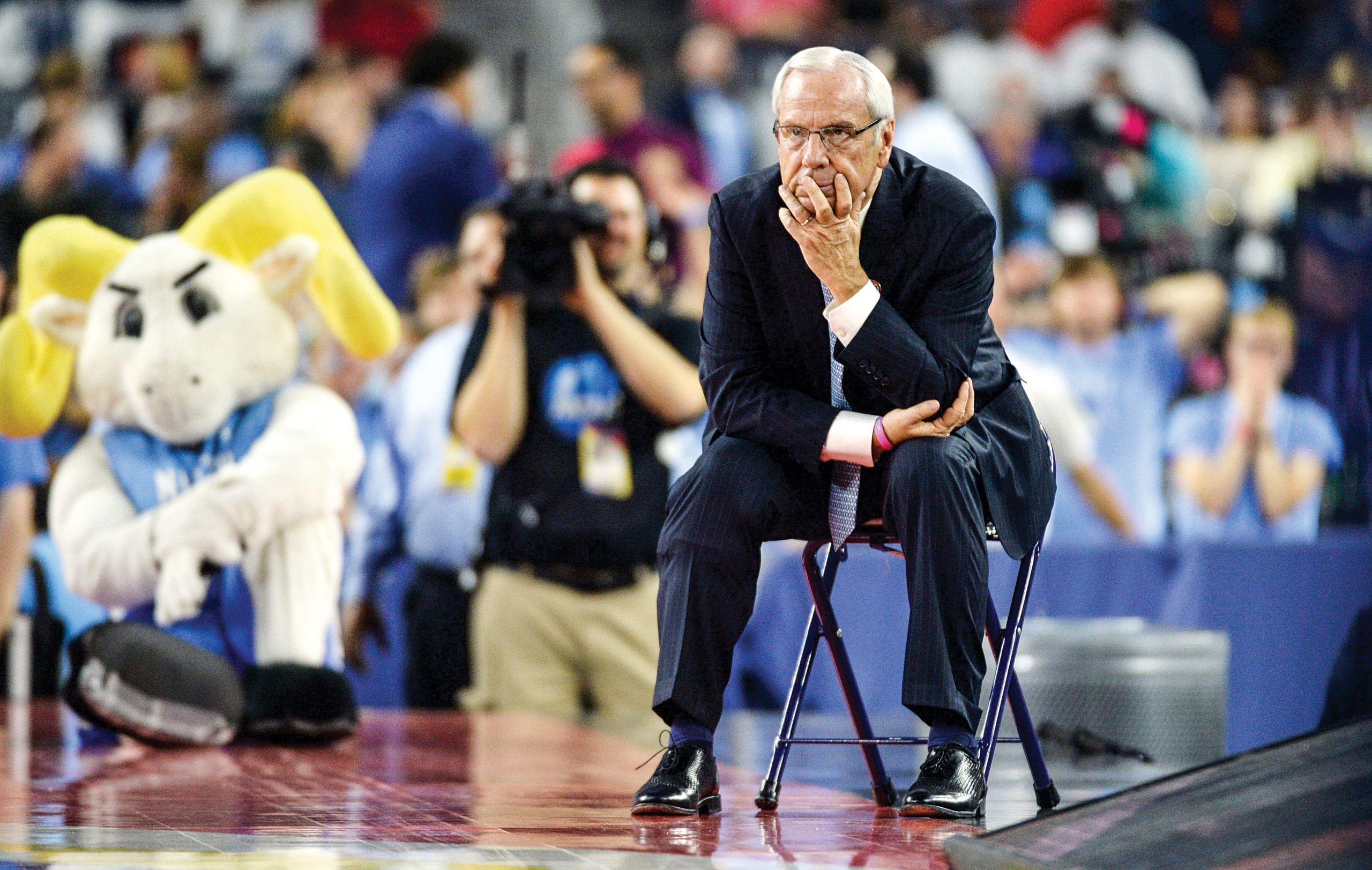
Roy Williams ’72 felt a weight on his shoulders much of this season — lightened by coaching one of his all-time favorite teams. Doubt crept in at times, and the coach beat himself up over a loss to Duke, but the Heels were redeemed by tournament time. (Photo by Chuck Liddy/The News & Observer.
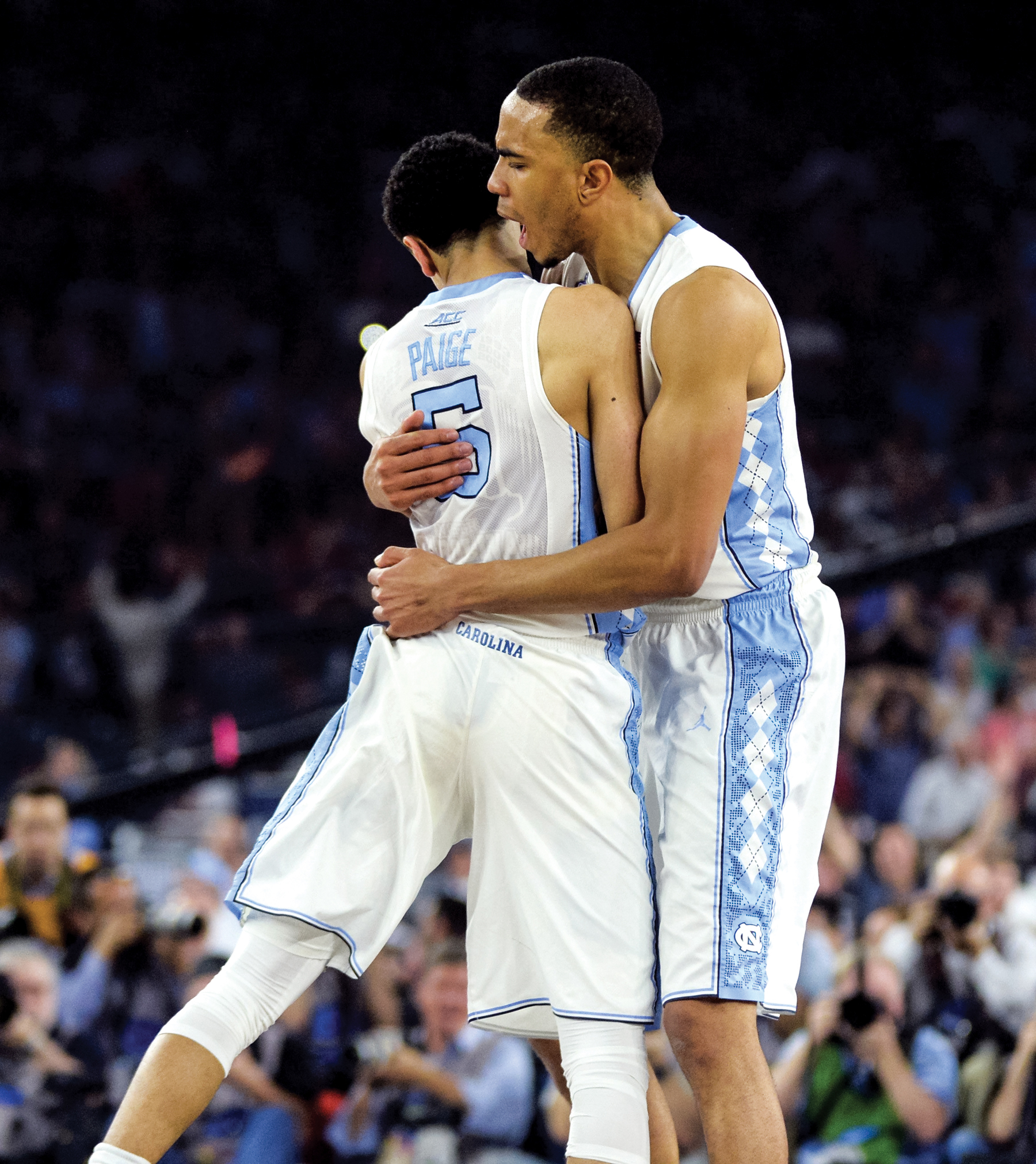
Paige and Brice Johnson celebrate Paige’s game-tying shot. (Photo by Chuck Liddy/The News & Observer)
“The difference between winning and losing in college basketball is so small,” Coach Roy Williams ’72 noted after his team fell to Villanova 77-74 on a 3-point shot at the buzzer. “The difference in your feelings is so large. But that’s the NCAA tournament. That’s college basketball.”
The tantalized Tar Heels indulged in little public shaking of fists or wringing of hands at a fate that abruptly ended their dream. “The fireworks go off. You want that to be your moment, as bad as you want anything in your life,” conceded Marcus Paige ’16, whose own acrobatic 3-pointer with 4.7 seconds remaining tied the score at 74. “You don’t know how much our team wanted this game. We just came up a little bit short.”
The imperative to win — and to avoid losing — is as prevalent in college athletics as anywhere else, and it’s as likely to produce a conflict of priorities. For the longest time, UNC took great pride in navigating ambiguous terrain with teams that played at a high level while adhering to a competitive and ethical balance dubbed “the Carolina Way.” In other times, this season’s poised, unflinching group of veterans would have earned praise as the personification of that approach.
But starting in 2011, the exemplary interplay of academic and athletics values nurtured under the leadership of Frank Porter Graham (class of 1909), William Friday ’48 (LLB), Dean Smith and others was undercut by revelation of fraudulent courses offered for 18 years in African and Afro-American studies.
In May 2015, the National Collegiate Athletic Association, itself besieged by challenges to the fairness of its rules and practices, formally alleged “lack of institutional control,” among the most serious of infractions. The enforcement side of college sports’ governing body found Carolina athletes maintained eligibility by taking advantage of improper academic benefits. In formulating its response, the University uncovered and reported other possible rules violations, delaying the proceedings.
While the NCAA investigated — and reinvestigated — whole playing seasons slipped past, shadowed by the threat of punishment that could limit future competitiveness and besmirch athletics, a major source of institutional pride key to marketing the University. The basketball team’s advance through the NCAA tournament was accompanied by popular commentary on the athletics program’s checkered reputation.
Williams, in his 13th season at UNC, regularly dismissed these concerns as “stuff” and “junk” when raised by observers beyond the University, alternating between weary impatience and angry declaration. Perceived disrespect, much of it basketball-related, was woven into the motivational tale he told his players, culminating with the coach’s late-season laments that this was “the most criticized, least appreciated team I’ve had.”
From fifth to first
Against that backdrop, the 2015-16 Tar Heels, a talented group returning nine of the previous season’s top 10 scorers, made a spirited run at the school’s sixth NCAA championship. Six players arrived at Chapel Hill as prestigious McDonald’s high school All-Americans. The team had multiple options at every position. Still, experts considered Carolina’s pool of talent a bit shallow by the school’s own standards, and Williams seemed to agree. “I said last year the NBA wasn’t beating their door down trying to get them to go,” he said.
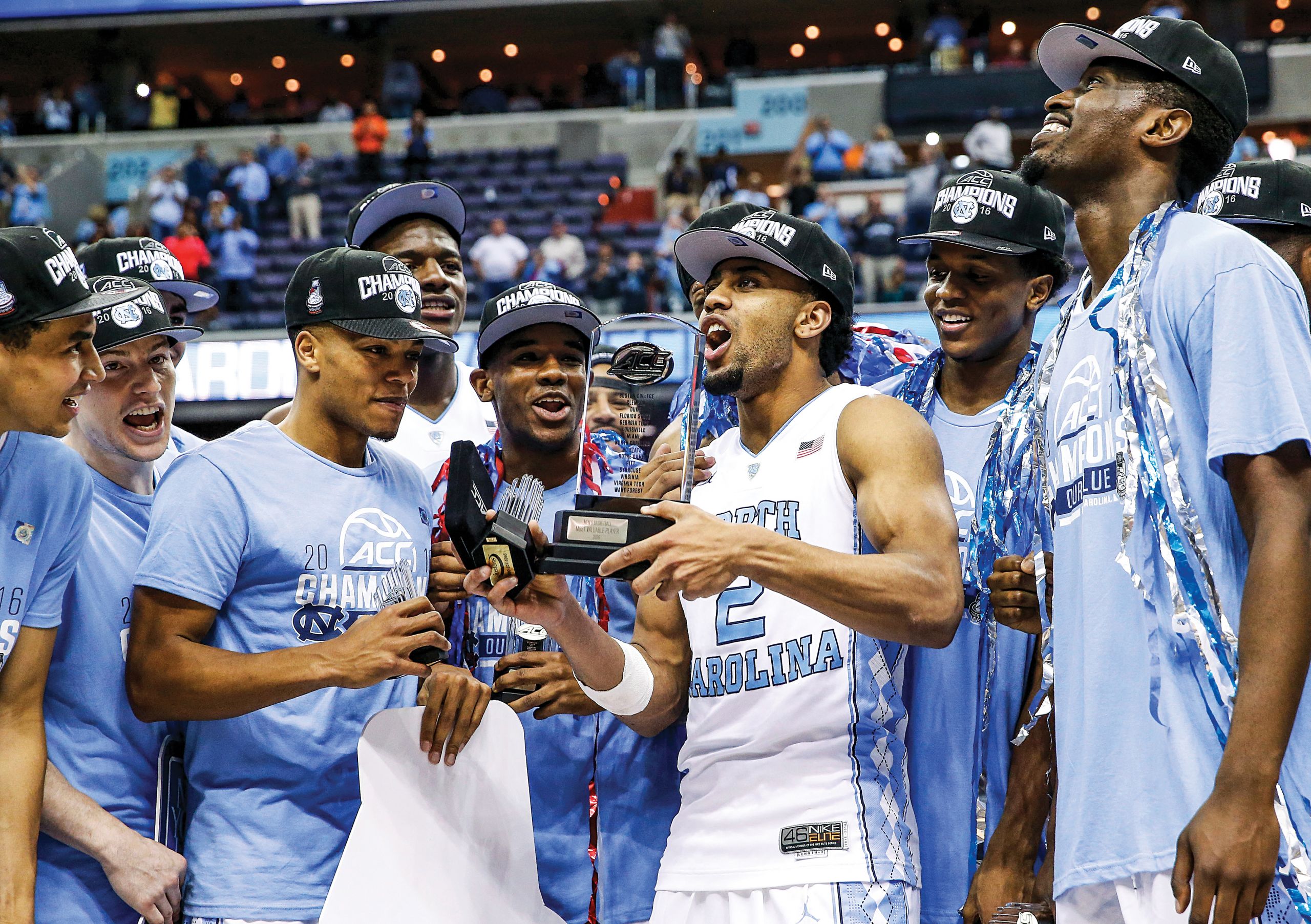
Joel Berry, here celebrating his ACC Tournament MVP trophy, overcame injury to emerge as a leader. (Photo by Alex Brandon/AP)
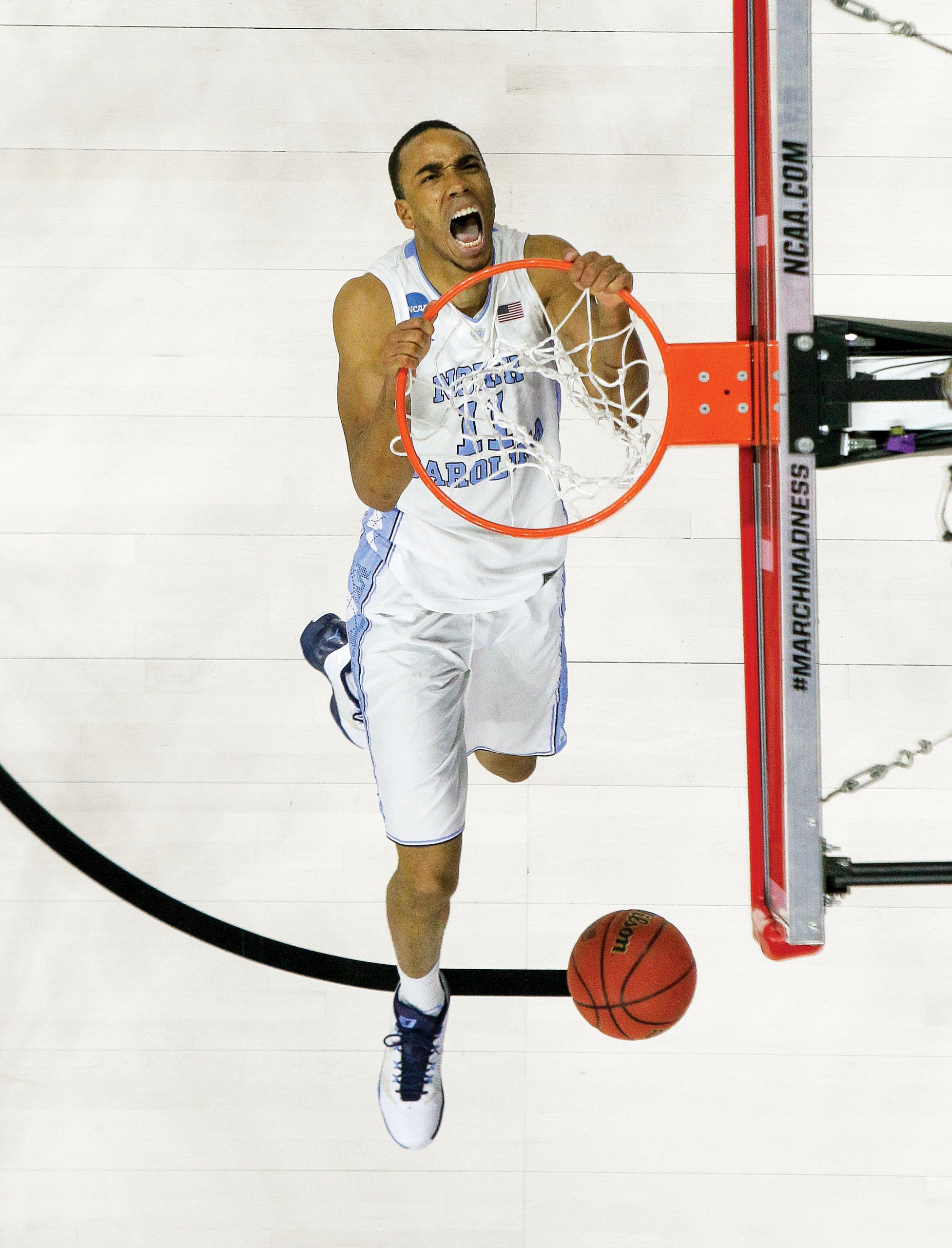
Johnson had a breakout year, earning first team All-American honors — the first for the Heels since 2008 — and a trip to the Smith Center rafters. (Photo by David J. Phillip/AP)
Revealingly, then, over the two preceding seasons only junior J.P. Tokoto ’16 left to play professional basketball, landing in a developmental league. Meanwhile, Duke won the 2015 NCAA title with three freshman starters who quickly departed college to become first-round NBA draft choices and had another one-and-done star leave early in 2016.
But what the ’16 Heels lacked in itinerant talent they made up for with experience and teamwork, morphing into a polished expression of Williams’ basketball vision. Carolina finished 33-7, the program’s most victories since the 2009 national championship season. Fifth-place finishers in 2015, the Heels fought their way to the top of the Atlantic Coast Conference during the 2016 regular season, a feat last achieved the year prior to the seniors’ arrival at Chapel Hill. They capped the league portion of their season by winning the school’s 18th ACC tournament title, breaking a seven-year drought as the conference’s official champion.
Carolina went into the tournament a No. 1 seed for the 15th time and reached the Final Four for the 19th, both more than any other program in history. The trip to the national semifinals was Williams’ fourth at his alma mater, including championships in 2005 and 2009. And UNC got to the NCAA title contest for the 10th time, fulfilling a mission that started with the top ranking in the preseason polls. It now has the second most tournament appearances and the second most wins overall.
Senior Brice Johnson ’16 had a breakout year and was chosen first-team All-American, the only Tar Heel so honored since Tyler Hansbrough ’09 in 2008. Johnson averaged double figures in scoring (17.0) and rebounds (10.4). He had 10 or more of both in 36 of 40 games, including an astonishing 39 points and 23 rebounds in a win at Florida State.
Long-limbed and quick-leaping, the 6-foot-9 forward was a force around the basket, his emotion spilling out in full-throated roars when he made one of his 59 blocked shots. “He’s demonstrative when I ask him what he wants for lunch,” said Williams, who perpetually prodded the flamboyant Johnson to make the most of his abilities.
Point guard Joel Berry II was voted Most Valuable Player in the ACC Tournament, also a first for a Tar Heel since Hansbrough in 2008. A football quarterback and safety in high school, the muscular Floridian was injured and a bit behind the curve as a freshman. His confidence bolstered by summer competition with former Carolina players, Berry grew into a leader on the court. By season’s end, the sophomore emerged as the team’s second-best scorer (12.8), most accurate 3-point shooter (.382) and leader in assists (151), steals (58) and free throw acuity (.867). “I thought he was our most consistent player,” Williams said.
Paige was the school’s first repeat Academic All-American since Tyler Zeller ’12 in 2011 and 2012. He also was a repeat recipient of the Skip Prosser Award as the league’s premier scholar-athlete. Majoring in history and journalism, Paige was an accommodating media darling, so well-spoken the University touted him early in his career as a model student-athlete.
The ACC’s preseason co-Player of the Year also was the unquestioned pacesetter for the team. For years, Paige carried the perimeter shooting burden for UNC, his clutch scoring one of the team’s strengths even during a junior year plagued with injuries. He started the 2015-16 season with a broken wrist and missed the first six games. Barely a month later, the Iowan fell into a prolonged and perplexing shooting slump that contributed to bouts of team inconsistency.
When Paige missed 21 of 22 attempts from 3-point range over four games, Williams was asked what corrective action could be taken besides continuing to work on shot selection and mechanics. “I guess they pay me a lot of money to say, ‘I don’t know,’ ” the coach offered. He quickly added: “I’ve never had a player that I had more confidence in in my entire life than Marcus Paige.”
That confidence was rewarded in a variety of ways, including a rebirth of shooting acumen in postseason and a 12.6-point scoring average overall. “If I click here down the stretch, no one will care what I was doing in the middle of January,” Paige said. He made nearly half his 3-pointers during the NCAA tournament, giving the Heels key jolts of momentum.
“Marcus is a young man who’s felt the weight of the world his four years,” Williams said of the “tough nut” who led the squad. “I’ve never coached a young man that I’ve admired more than I’ve admired Marcus Paige.”
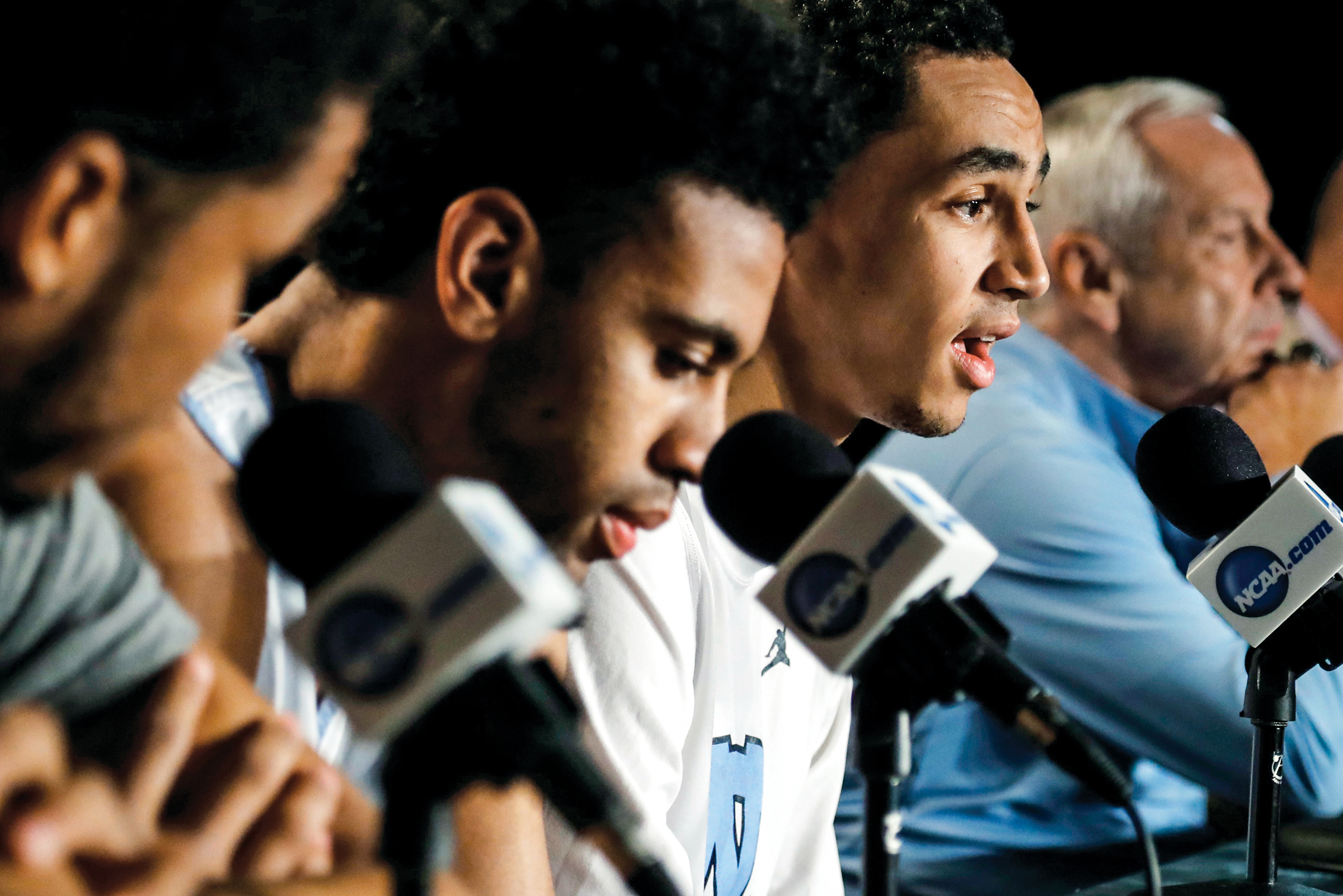
Paige missed the early part of the season with an injury, then fell into an uncharacteristic shooting slump. But as a leader he was never better, and he scored in the classroom as a repeat Academic All-American and winner of the ACC’s scholar-athlete award. (Photo by Matt Rourke/AP)
Toughness found
Commenting on his team after it easily dispatched second-ranked Maryland on Dec. 1, Williams said that “if they give us that kind of effort every game, we can be a special team.” As things turned out, it was special enough to enjoy the school’s best Smith Center record since 2012, losing only to Duke.
Following strategy learned from his mentor, Dean Smith, Williams let play continue to the last pressure-packed possession in the Duke game in the Smith Center, trusting his team would execute well with the outcome in the balance. It did not, nearly bringing the coach to tears afterward because he did not intervene.
The public sometimes questioned the team’s toughness, and Williams did, too, such as after a loss at Notre Dame in February and after the painful loss to Duke at home 11 days later. They were a different — a convincing — team at the regular season’s end in Cameron, the seniors’ first win there, and in avenging the loss to Virginia at Charlottesville in the ACC title game.
In the end, Carolina was a team of many strengths. Fleet and skilled, the Heels led the ACC in scoring offense. Prior to the Villanova game, the No.1-seeded team won all five NCAA tournament contests by double-digit margins.
Most North Carolina opponents chose to avoid open-court situations, unable to function effectively at the speedier tempo Williams coveted. Waving his players onward before the defense got set, he sought shots launched within the first five or six seconds of a possession and big men crashing the boards.
The Heels also led the conference in rebounding margin and rebounding offense. Built with an old-fashioned offensive emphasis on working from the inside out, they frequently dominated the interior with upperclassmen Johnson, the foul-plagued Isaiah Hicks and Kennedy Meeks.
Carolina’s shooting from the floor was its best since 2008. As Williams liked to say: “Everything looks better when the ball goes in the basket.” That efficiency was achieved despite a .327 conversion rate on 3-pointers, the worst at UNC since the shot was legalized for the 1986-87 season.
The Heels shot well (.747) at the foul line, and its 17.8 assists per game was the fourth best in Division I. Four Tar Heels — Berry, Paige, Justin Jackson and Theo Pinson — each had more than 100 assists. That had happened only once previously (1973) since the school began recording the statistic in 1969. Among the coaching staff’s points of emphasis all season was reducing unforced errors handling the ball: UNC led the league and was third nationally with 1.65 assists per turnover.
Perhaps as important as anything, though, North Carolina learned to play tough defense. Early in the season there were flashes of lock-down prowess, starting with the smothering home win over Maryland. Later in the year, as with the best of Williams’ previous teams, Carolina hit a choking defensive stride.
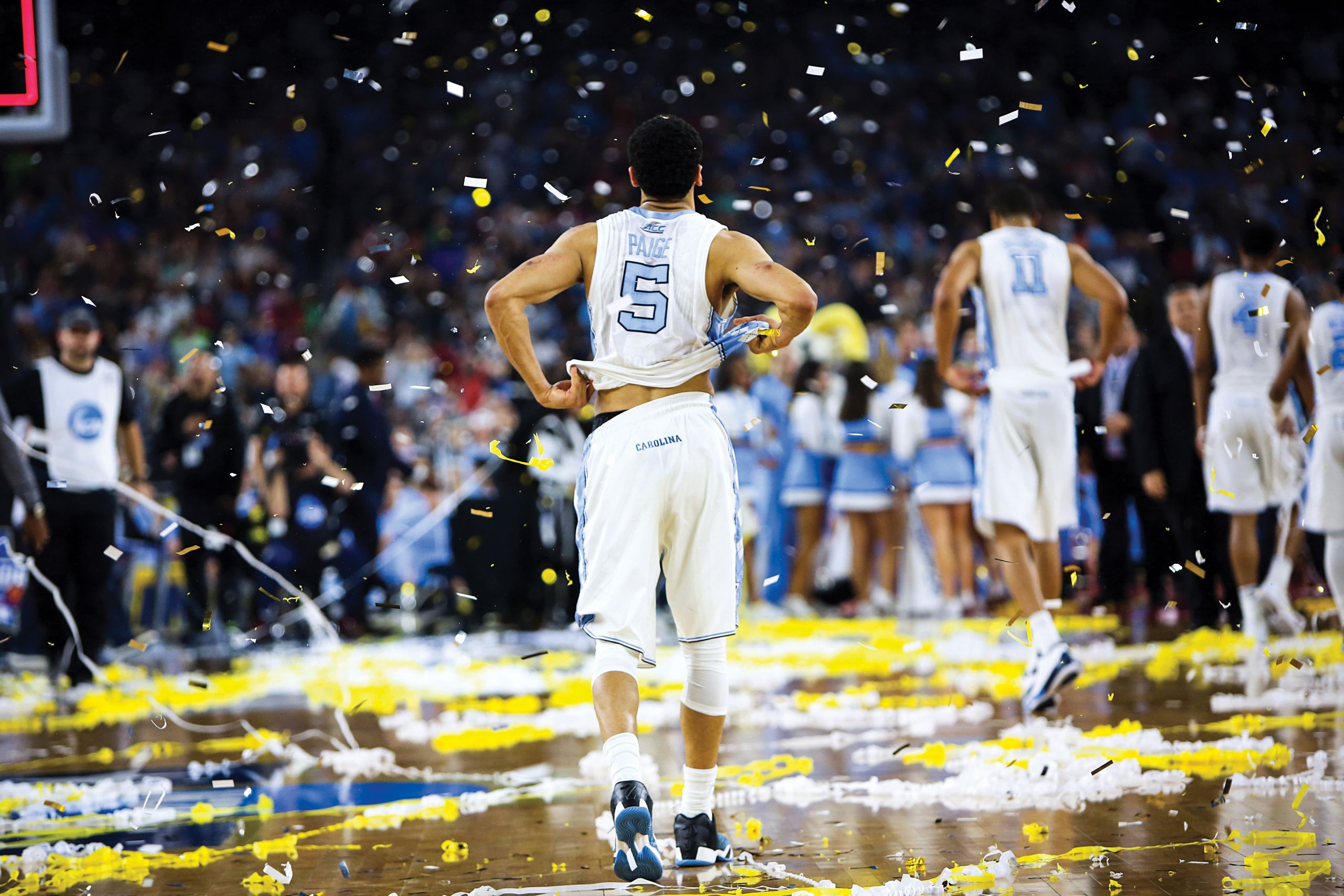
The confetti fell for others, but it took two to play one of the most riveting championship games in NCAA history, and the way Williams and the Carolina players handled themselves in the aftermath left room for a lot of pride. (Photo by Kendall Bagley/Daily Tar Heel)
‘I wouldn’t trade it’
Ultimately, that came up against a Villanova team that made 58.3 of its field goal tries, 57.1 on 3-pointers, both highest by a UNC opponent all season.
Many Tar Heel fans had to swear off televised highlights for a few days. What brought joy to Philadelphia produced anguish in Chapel Hill. Gradually, smiles returned, and for familiar and important reasons; such as, somewhere between 50 and 55 former players made the trip to Houston — from Lenny Rosenbluth ’57 to Kendall Marshall ’14.
To Michael Jordan ’86.
Williams found Jordan outside the locker room and asked him to be first to speak to the Tar Heels, on whom the confetti had fallen only coincidentally.
Jordan reminded them that adversity has its place in the game because it makes you stronger. Then he told them: “I’m proud of you.”
Paige spoke for the team that had an emotionally wrenching year and left all they had on the floor: “The whole four years means the world to me. I wouldn’t trade any of the losses, any of the games. It’s hard to say, but even including this one, I wouldn’t trade it for anything.
“This has been the happiest and most fun four years of my life, talking this year especially. Hasn’t been my best year as a player, but this has been the most fun I’ve had in my entire life with this team, all the way up until that last horn went off.”
Within days of the title game, Williams visited four prospects’ homes and assured one player he expected to remain on the job for at least five more years. He is contemplating knee replacement surgery. And, he said, “I hope to coach till I can’t.”
Barry Jacobs is a freelance writer based in Hillsborough who, as a reporter and commentator, has covered ACC basketball since 1976.
Online: NCAA Makes Changes in Notice of Allegations
Thanks for reading the Carolina Alumni Review
Carolina Alumni members, sign in to continue reading.
Not yet a member? Become one today.
